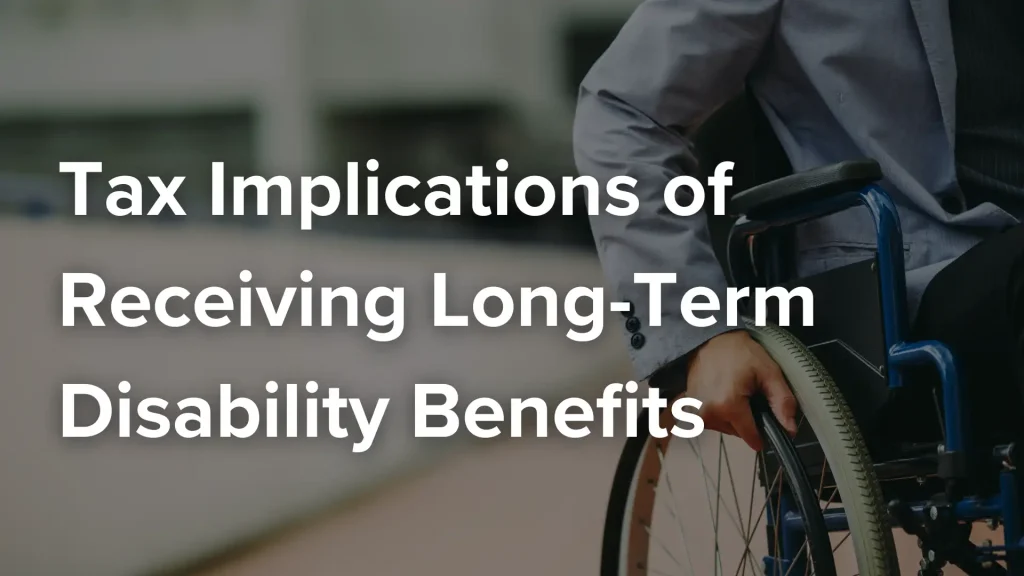Posted on Tuesday, July 15th, 2025 at 9:00 am

Long-term disability (LTD) benefits and legal options can provide crucial financial support if you are unable to work due to illness or injury. But when tax season arrives, many people wonder: Are long-term disability benefits taxable? The answer depends on key details, like who paid the premiums and whether they were paid with pre-tax or after-tax dollars—factors that directly affect how long-term disability benefits are taxed.
Understanding how the IRS treats long-term disability income can help you avoid surprise tax issues and plan ahead, especially if you’re asking, ‘Are long-term disability benefit payments taxable?’ and relying on LTD as your primary income source.
Are Long-Term Disability Benefits Taxable?
The tax status of your LTD benefits hinges on whether your employer or you paid for the coverage and how those payments were handled.
- Employer-paid premiums (pre-tax dollars): If your job paid for your long-term disability insurance and didn’t count it as part of your paycheck, then any money you get from that insurance is taxed just like normal income.
- Employee-paid premiums (after-tax dollars): If you paid the full premium with after-tax dollars, your benefits will generally be tax-free.
- Shared cost: If both you and your employer contributed, or if premiums were paid with pre-tax dollars through a cafeteria plan, a portion of the benefits may be taxable.
This means two people receiving the same monthly benefit could owe vastly different taxes depending on how their policies were funded.
How the IRS Views Long-Term Disability Benefits
The IRS classifies long-term disability benefits as income, but they’re handled differently than a regular paycheck. They’re not subject to payroll taxes like Social Security or Medicare; they may come with special tax rules depending on your situation.
For employer-sponsored plans, the IRS typically classifies them in three ways:
- Fully employer-paid: Benefits are 100% taxable.
- Fully employee-paid (after-tax): Benefits are 100% tax-free.
- Split premiums: Benefits are partially taxable based on the employer’s share.
For example, if your employer paid 60% and you paid 40% with after-tax dollars, 60% of the benefit may be taxed.
You may also receive specific tax documents depending on how your benefits are issued:
- Form W-2: If your employer pays the benefit directly.
- Form 1099: If paid through a third-party insurer.
Understanding how your benefits are classified—and which tax forms to expect—can help you avoid confusion and stay organized when it’s time to file.
What About Disability Insurance Premium Deductions?
Most people can’t receive a tax break for paying disability insurance if the policy replaces their income. The IRS sees this as a personal expense, not something you can write off.
But if you are self-employed, the rules are a little different. You may be able to deduct the cost of disability insurance that helps cover your business expenses. However, you can’t deduce the money that replaces your income.
How to Avoid a Surprise Tax Bill

Many people mistakenly believe long-term disability (LTD) benefits are always tax-free, only to get a hefty bill during tax season. To avoid that stress, it’s paramount to plan ahead:
- Know how your premiums were paid. Ask your HR department or insurance provider if the premiums were paid with pre-tax or after-tax dollars. This determines whether your benefits are taxable.
- Plan for withholding. If your benefits are taxable, ask the insurer or employer to withhold federal income taxes. If that’s not possible, set aside money each month for taxes.
- Avoid common mistakes. Don’t assume your benefits are tax-free without checking. Failing to report taxable LTD income or skipping tax prep could lead to penalties or audits.
- Review your policy regularly. Check your LTD coverage yearly—especially if you change jobs, switch plans, or adjust contributions.
- Talk to a professional. A tax lawyer in Pennsylvania can help you understand your exact obligations and avoid unexpected tax problems.
Being proactive now can save you a lot of financial stress later.
Please read more about residual disability benefits here: What Are Residual Disability Benefits?
When to Contact a Disability Lawyer
While tax professionals can help you handle the numbers, a long-term disability attorney in Pennsylvania can step in if you are fighting for benefits that have been delayed, denied, or cut short.
At Capitan Law, our legal team focuses exclusively on long-term disability claims and appeals. Whether navigating complex IRS rules on disability income or trying to understand your plan’s tax structure, we are here to help you every step of the way.
If you are unsure about your LTD policy or facing pushback from the insurance company, contact us today or call (267) 419-7888. You can also learn more about our long-term disability practice and how we support people across Philadelphia and beyond.
Related Post
Can You Work While Receiving Long-Term Disability Benefits?
Neurological Disorders and Their Eligibility for LTD Benefits